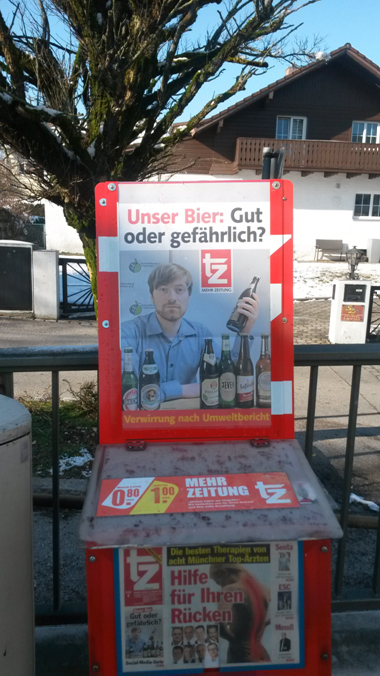Greenies use beer bazooka against weed killer glyphosate
You cannot fault them for their perfect timing. On 25 February 2016, when the German parliament was to cast a vote on whether to extend approval for the use of glyphosate, the world’s most widely used weed killer, media screamed that a Munich environmental institute had found traces of the pesticide in 14 of Germany’s most popular beers. All the same, parliament voted in favour of the extension.
Obviously, thanks to its long use, glyphosate is so ubiquitous in the environment that traces of it can be found even in people’s urine. You just have to use some high-tech laboratory equipment and go look for it. Still, few people in Germany would have known or cared. This, the environmentalists hoped to change by detecting glyphosate in beer – seemingly the only foodstuff that Germans really believe to be pure.
As could be expected, German brewers, who celebrate the 500th anniversary of the purity law for beer this year, were up in arms. They issued a flaming defence of their beers, saying that the findings were not credible. They cited Germany’s Federal Institute for Risk Assessment which had said the levels did not pose a risk to consumers’ health.
How glyphosate ends up in the beer – via raw materials or water – was not the issue. The German DBV farm federation nevertheless promptly denied responsibility, saying direct glyphosate usage on barley – turned into malt – was banned. The group, however, added that the chemical could have been sprayed on fields before sowing.
The battle against glyphosate has been raging for months in an effort to make the European Commission, the EU’s executive branch, change its mind. In early March 2016 the European Commission was expected to extend approval for the use of glyphosate for a further 15 years. The current license for Europe expires at the end of June this year.
In their attempt to sway public opinion, environmentalists used beer as their big bazooka against the controversial weed killer because scientific evidence to its perceived health threat is inconclusive.
A major row between scientists warning against glyphosate and others playing down the risks deepened in March last year, when the WHO’s Lyon-based International Agency for Research on Cancer (IARC) said glyphosate was “probably carcinogenic to humans.”
The European Food Safety Authority (EFSA), on the other hand, judged in November 2015 that the substance was “unlikely to pose a carcinogenic hazard to humans.”
European Union lawmakers already showed their disapproval of glyphosate on 3 February 2016 by voting in favour of nonbinding resolutions that called on the European Commission to reject authorizations for three genetically engineered soybeans on the basis that they had been modified to tolerate glyphosate.
What makes glyphosate particularly controversial is that it is marketed by the U.S. agriculture giant Monsanto, amongst others. Environmental campaigners feared that the European Commission’s rushed consent was meant as a concession to big corporations in the proposed EU-US trade deal (TTIP).
Due to doubts about glyphosate in other EU member states the Commission decided to postpone its decision at the last minute. The beer bazooka did hit its target after all.
Keywords
Germany glyphosate environment international beverage market
Authors
Ina Verstl
Source
BRAUWELT International 2016

